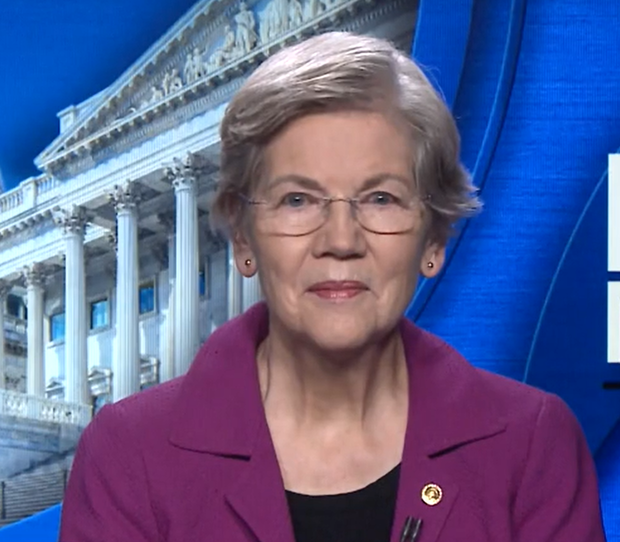Washington — Massachusetts Sen. Elizabeth Warren said Sunday that a proposal from Congress to lift the Federal Deposit Insurance Corporation’s (FDIC) insurance cap from its current $250,000 limit is an option that has “got to be on the table right now” as lawmakers debate how to respond to the rapid collapse of two banks earlier this month.
“I think the lifting the FDIC insurance cap is a good move,” Warren said in an interview with “Face the Nation.” “Now the question is where’s the right number on lifting? But recognize that we have to do this, because these banks are under-regulated, and if we lift the cap, we are requiring — or relying even more heavily on the regulators to do their jobs.”
The Democratic senator said the key question for Congress to work through is where to set the insurance cap for FDIC deposits.
“Is it $2 million? Is it $5 million? Is it 10 million?” she said. “Small businesses need to be able to count on getting their money to make payroll, to pay the utility bills. Non-profits need to be able to do that. These are not folks who can investigate the safety and soundness of their individual banks. That’s the job the regulators are supposed to do.”
Warren declined to say whether she is speaking with the White House about a plan to lift FDIC insurance levels above its $250,000 cap, but said “it is one of the options that’s got to be on the table right now.”
The abrupt closure of Silicon Valley Bank on March 10, followed by the collapse of Signature Bank of New York days later, sent federal banking regulators scrambling to craft a plan to shore up the banking system and reassure Americans they can have confidence in the financial system.
As part of the emergency measures from the Biden administration was to ensure all depositors with accounts at Silicon Valley Bank would have access to all of their money. The Federal Reserve also set up a new lending facility to help financial institutions meet depositors’ needs.
But the collapse of the two banks has put renewed scrutiny on top banking regulators, including Federal Reserve Chair Jerome Powell.
Warren said Sunday that regulators and the executives of these banks should be held accountable, and criticized the Fed and Powell specifically, who she said is a “dangerous man to have in this position.”
“We need accountability for our regulators who clearly fell down on the job, and that starts with Jerome Powell, and we need accountability for the executives of these large financial institutions,” Warren said. “Look, there should be clawbacks for Gary Becker and the others who explode these banks.”
The senator from Massachusetts also said she does not have confidence in Mary Daly, the president of the San Francisco Fed, as public disclosures indicated as early as December there were issues with Silicon Valley Bank.
“The Fed should have acted, but the San Francisco Fed and the Federal Reserve Bank,” she said. “Remember the Federal Reserve Bank and Jerome Powell are ultimately responsible for the oversight and supervision of these banks. And they have made clear that they think their job is to lighten regulations on these banks. We’ve now seen the consequences.”
Warren said Powell “needs to turn around 180 degrees and put these banks under more careful scrutiny,” and Congress tighten banking regulations.
“This whole tranche of banks has been under-regulated for five years now. And people are very concerned about when you lift the hood, what’s under the hood, since the regulators clearly have not been on top of their job,” she said. “It’s the reason that I’m calling right now for changes in the Fed in its regulatory approach, and changes in Congress so that we’ve rolled back the authorization to lighten those regulations.”
Warren on Sunday separately called for an independent investigation into the bank and regulatory failures, and requested the inspectors general at the Treasury, FDIC and Federal Reserve provide a preliminary report to Congress in 30 days.
